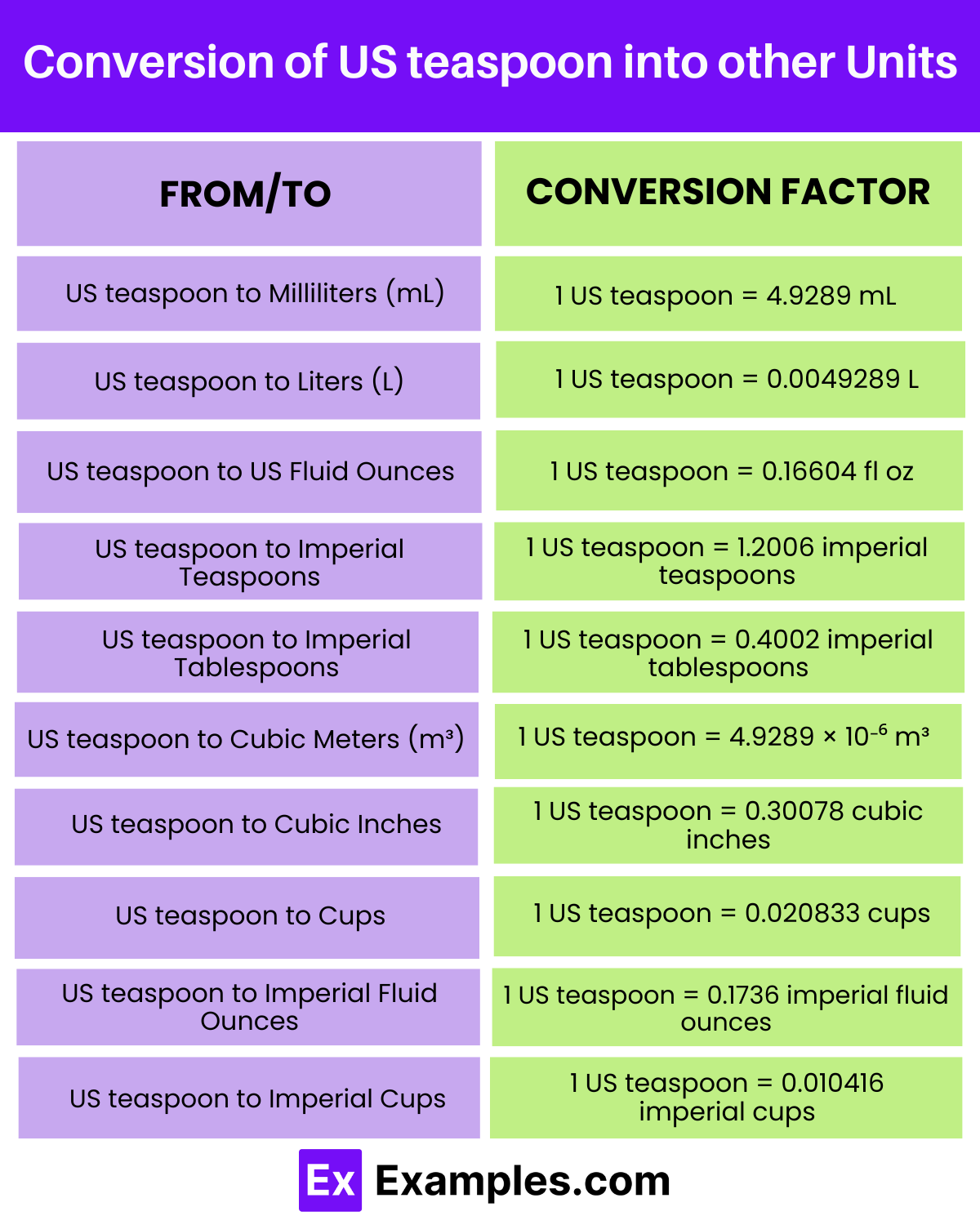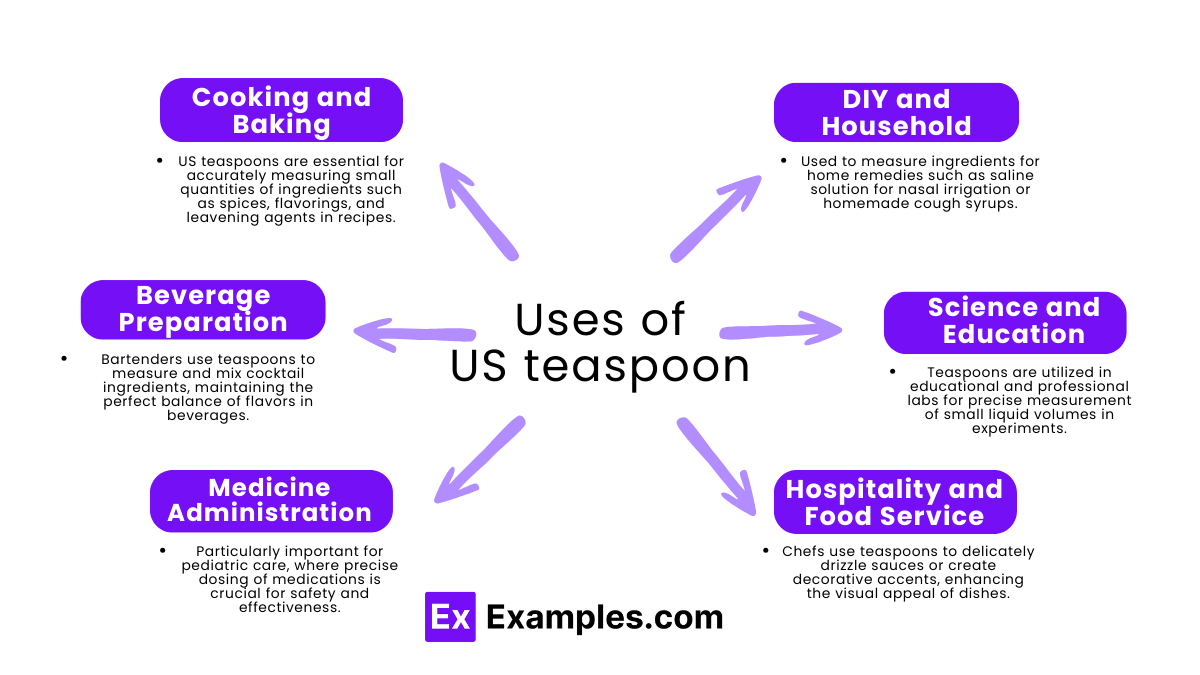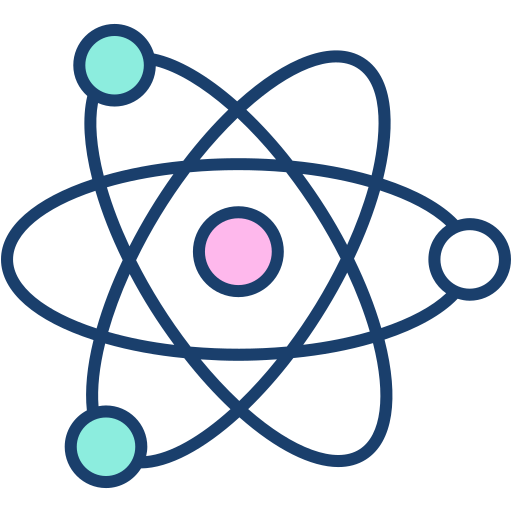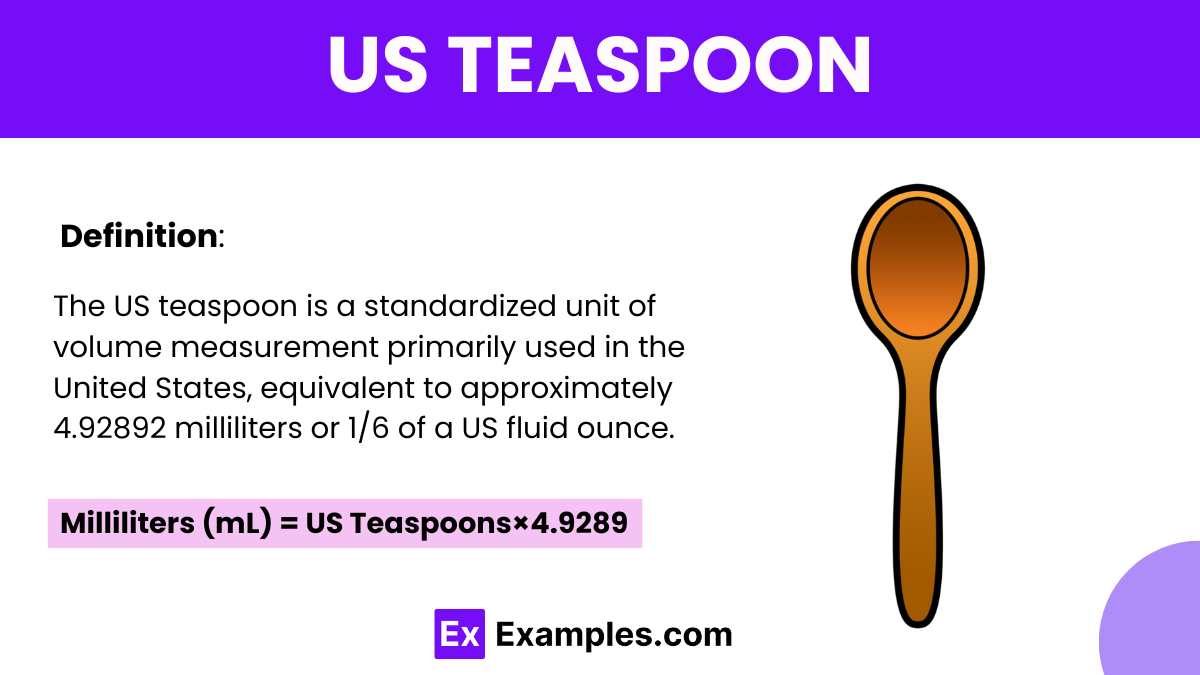US teaspoon
The US teaspoon is a units of volume measurement commonly used in culinary settings and household cooking. It is a standardized measurement in the United States, often employed to add precise amounts of ingredients to recipes. In the realm of volume measurements, it plays a crucial role alongside other units such as the US tablespoon, US fluid ounce, and US liquid gallon. Understanding the relationship between the teaspoon and these units is essential for accurate measurement in both culinary applications and scientific contexts, where volume is a fundamental concept in physics and chemistry. While small in comparison to larger units like liters and cubic meters, the US teaspoon holds significance in everyday cooking, offering a convenient measure for liquids and dry ingredients alike.
What is US teaspoon
US teaspoon Formula
Practical Example for the US teaspoon Formula
Suppose you’re following a recipe that calls for 3 US teaspoons of vanilla extract.
Application of the Formula:
To determine how many milliliters of vanilla extract you need, you would use the conversion formula:
Milliliters (mL)=US Teaspoons×4.9289
Calculation:
Milliliters (mL)=3 US teaspoons×4.9289 mL/teaspoon
Result:
Milliliters (mL)=14.7867 mL
Interpretation:
You would need approximately 14.79 milliliters of vanilla extract to fulfill the recipe’s requirement of 3 US teaspoons. This calculation ensures precise measurement and accurate flavoring in your culinary creation.
How to Measure with a US Teaspoon
- Select the Correct Spoon: Ensure you’re using a standardized US teaspoon measuring spoon. These spoons are specifically designed to hold a precise volume of liquid or dry ingredients.
- Fill the Spoon: Use the spoon to scoop or pour the ingredient you’re measuring. For liquids, fill the spoon to the brim. For dry ingredients, level off the excess with a flat edge, such as the back of a knife, for an accurate measurement.
- Leveling Off: It’s essential to level off the ingredient in the spoon to ensure accuracy, especially for dry ingredients like flour or spices. This helps avoid over or under-measuring.
- Read the Measurement: Hold the spoon level and at eye level to accurately read the measurement. The volume marked on the spoon corresponds to the standard US teaspoon measurement.
Examples of Measuring with a US Teaspoon
- Vanilla Extract: A recipe calls for 1 US teaspoon of vanilla extract. Use a measuring spoon to pour the vanilla extract into the spoon until it’s level with the rim. This ensures you’re adding precisely 1 US teaspoon of vanilla to the recipe.
- Salt: When seasoning a dish, the recipe may specify adding 1/2 US teaspoon of salt. Use a measuring spoon to scoop the salt, then level it off with a knife for an accurate measurement. This ensures you’re not oversalting or undersalting the dish.
- Baking Powder: In baking, a recipe might require 2 US teaspoons of baking powder. Use a measuring spoon to scoop the baking powder, ensuring it’s level with the spoon’s edge for precise leavening in your baked goods.
- Ground Spices: When adding ground spices like cinnamon or cumin to a recipe, use a US teaspoon measuring spoon to portion out the correct amount. Level off the excess to ensure the spices don’t overpower the dish.
Difference Between teaspoon and tablespoon
| Feature | Teaspoon (US) | Tablespoon (US) |
|---|---|---|
| Volume in Milliliters (mL) | 1 teaspoon = 4.92892 mL | 1 tablespoon = 14.7868 mL |
| Volume in Fluid Ounces (fl oz) | 1 teaspoon = 0.166667 fl oz | 1 tablespoon = 0.5 fl oz |
| Relation to Larger Units | 1 teaspoon = 1/3 tablespoon | 1 tablespoon = 3 teaspoons |
| Common Use | Used for smaller measurements, especially in baking and cooking for precision. | Used for larger liquid and dry measurements in cooking and serving. |
| Culinary Application | Ideal for adding spices, extracts, and small quantities of liquids. | Used for portioning ingredients like butter, oil, and sugar. |
SI multiples of US teaspoon
| SI Prefix | Multiplier | US Teaspoons Equivalent in Milliliters |
|---|---|---|
| Kilo- (k) | 10³ | 1 US teaspoon = 4.9289 mL, so 1 kilo-US teaspoon = 4,928.9 mL |
| Deca- (da) | 10¹ | 1 US teaspoon = 4.9289 mL, so 1 deca-US teaspoon = 49.289 mL |
| Deci- (d) | 10⁻¹ | 1 US teaspoon = 4.9289 mL, so 1 deci-US teaspoon = 0.49289 mL |
| Centi- (c) | 10⁻² | 1 US teaspoon = 4.9289 mL, so 1 centi-US teaspoon = 0.049289 mL |
| Milli- (m) | 10⁻³ | 1 US teaspoon = 4.9289 mL, so 1 milli-US teaspoon = 0.0049289 mL |
| Micro- (μ) | 10⁻⁶ | 1 US teaspoon = 4.9289 mL, so 1 micro-US teaspoon = 0.0000049289 mL |
Conversion of US teaspoon

| To Unit | Conversion Factor | Example Conversion |
|---|---|---|
| US teaspoon to Milliliters (mL) | 1 US teaspoon = 4.9289 mL | 10 US teaspoons = 49.289 mL |
| US teaspoon to Liters (L) | 1 US teaspoon = 0.0049289 L | 10 US teaspoons = 0.049289 L |
| US teaspoon to US Fluid Ounces | 1 US teaspoon = 0.16604 fl oz | 10 US teaspoons = 1.6604 fl oz |
| US teaspoon to Imperial Teaspoons | 1 US teaspoon = 1.2006 imperial teaspoons | 10 US teaspoons = 12.006 imperial teaspoons |
| US teaspoon to Imperial Tablespoons | 1 US teaspoon = 0.4002 imperial tablespoons | 10 US teaspoons = 4.002 imperial tablespoons |
| US teaspoon to Cubic Meters (m³) | 1 US teaspoon = 4.9289 × 10⁻⁶ m³ | 10 US teaspoons = 4.9289 × 10⁻⁵ m³ |
| US teaspoon to Cubic Inches | 1 US teaspoon = 0.30078 cubic inches | 10 US teaspoons = 3.0078 cubic inches |
| US teaspoon to Cups | 1 US teaspoon = 0.020833 cups | 10 US teaspoons = 0.20833 cups |
| US teaspoon to Imperial Fluid Ounces | 1 US teaspoon = 0.1736 imperial fluid ounces | 10 US teaspoons = 1.736 imperial fluid ounces |
| US teaspoon to Imperial Cups | 1 US teaspoon = 0.010416 imperial cups | 10 US teaspoons = 0.10416 imperial cups |
Notes
- Basic Conversions: The table includes conversions for US teaspoons to milliliters, liters, US fluid ounces, imperial teaspoons, and imperial tablespoons, offering fundamental volume measurements commonly used in culinary and household contexts.
- Metric and Imperial Equivalents: Additionally, the table presents conversions to cubic meters, cubic inches, cups, imperial fluid ounces, and imperial cups, catering to both metric and imperial measurement systems prevalent in different regions.
- Precision: The conversions are provided with high precision, ensuring accurate and reliable measurements for various applications, from cooking recipes to scientific experiments.
US teaspoon to Milliliters (mL)
A US teaspoon holds a specific volume, commonly measured in milliliters (mL). This conversion allows for precise measurements when dealing with small quantities of liquids or dry ingredients in recipes.
US teaspoon to Liters (L)
Converting US teaspoons to liters provides a broader perspective on volume, particularly useful when scaling up recipes or understanding liquid measurements in larger contexts such as beverage production or scientific experiments.
US teaspoon to US Fluid Ounces
US teaspoons are often converted to fluid ounces, a standard unit for liquid measurement in the United States. This conversion facilitates accurate pouring and mixing of ingredients in both culinary and bartending applications.
US teaspoon to Imperial Teaspoons
Understanding how US teaspoons convert to imperial teaspoons and tablespoons is essential for international recipes or when using cookware calibrated to the imperial system. It ensures consistency in measuring ingredients across different measurement standards.
US teaspoon to Imperial Tablespoons
Understanding how US teaspoons convert to imperial teaspoons and tablespoons is essential for international recipes or when using cookware calibrated to the imperial system. It ensures consistency in measuring ingredients across different measurement standards.
US teaspoon to Cubic Meters (m³)
While US teaspoons represent small volumes, converting them to cubic meters or cubic inches provides insight into their spatial dimensions. This is particularly relevant in engineering or construction contexts where precise measurements are vital.
US teaspoon to Cubic Inches
While US teaspoons represent small volumes, converting them to cubic meters or cubic inches provides insight into their spatial dimensions. This is particularly relevant in engineering or construction contexts where precise measurements are vital.
US teaspoon to Cups
US teaspoons are often converted to cups for easier understanding of recipe proportions, especially in cooking and baking. Additionally, knowing their equivalence to imperial cups allows for seamless adaptation of recipes from different regions.
US teaspoon to Imperial Fluid Ounces
US teaspoons are often converted to cups for easier understanding of recipe proportions, especially in cooking and baking. Additionally, knowing their equivalence to imperial cups allows for seamless adaptation of recipes from different regions.
US teaspoon to Imperial Cups
The conversion of US teaspoons to imperial fluid ounces is significant for international trade and culinary exchanges, ensuring accurate representation of liquid volumes across different measurement systems.
Practical Application Example of US teaspoon
Baking Chocolate Chip Cookies
Step 1: Gather Ingredients
- You’re baking chocolate chip cookies and need to measure out the ingredients.
- The recipe calls for 1 teaspoon of vanilla extract.
Step 2: Measuring Vanilla Extract
- Grab a US teaspoon measuring spoon and your bottle of vanilla extract.
- Use the measuring spoon to pour the vanilla extract until it reaches the rim of the spoon.
- Level off any excess liquid with the back of a knife to ensure accuracy.
Step 3: Adding to the Recipe
- Add the measured vanilla extract to the cookie dough along with the other ingredients.
- Stir the dough until all ingredients are well combined.
Step 4: Baking
- Scoop out portions of the cookie dough onto a baking sheet using a cookie scoop or another US teaspoon.
- Bake the cookies according to the recipe instructions.
Step 5: Enjoy!
- Once baked, let the cookies cool for a few minutes before enjoying them with a glass of milk or your favorite beverage
What are the Uses of US teaspoon?

Cooking and Baking
- Ingredient Measurement: US teaspoons are essential for accurately measuring small quantities of ingredients such as spices, flavorings, and leavening agents in recipes.
- Recipe Consistency: Ensures consistency in taste and texture of dishes by providing precise measurements for ingredients like salt, baking powder, and vanilla extract.
Beverage Preparation
- Mixing Drinks: Bartenders use teaspoons to measure and mix cocktail ingredients, maintaining the perfect balance of flavors in beverages.
- Brewing Beverages: Tea and coffee enthusiasts rely on teaspoons to measure loose tea leaves or ground coffee for brewing, ensuring consistent strength and flavor.
Medicine Administration
- Dosage Measurement: US teaspoons are used to measure and administer liquid medications, ensuring patients receive the correct dosage as prescribed.
- Children’s Medications: Particularly important for pediatric care, where precise dosing of medications is crucial for safety and effectiveness.
DIY and Household
- Crafting and DIY Projects: Teaspoons are handy for measuring small quantities of ingredients in homemade skincare products, candles, and other DIY projects.
- Household Remedies: Used to measure ingredients for home remedies such as saline solution for nasal irrigation or homemade cough syrups.
Science and Education
- Lab Experiments: Teaspoons are utilized in educational and professional labs for precise measurement of small liquid volumes in experiments.
- Teaching Tool: Educators use teaspoons to teach students about volume and measurement conversions, fostering understanding of mathematical concepts in a practical context.
Hospitality and Food Service
- Portion Control: In food service settings, teaspoons ensure consistent portion sizes for condiments, dressings, and garnishes, maintaining presentation and cost control.
- Accurate Plating: Chefs use teaspoons to delicately drizzle sauces or create decorative accents, enhancing the visual appeal of dishes.
FAQs
How accurate are US teaspoon measurements?
US teaspoons provide reasonably accurate measurements for small volumes of both liquid and dry ingredients.
Are there any health considerations when using US teaspoons for medicine administration?
Yes, especially when administering medication to children or elderly individuals. It’s crucial to use a calibrated US teaspoon measuring spoon for accurate dosage measurement.
What is a US teaspoon, and how does it differ from other teaspoons?
A US teaspoon is a standardized unit of volume measurement commonly used in the United States. It differs from other teaspoons, such as those in the metric or imperial systems.



